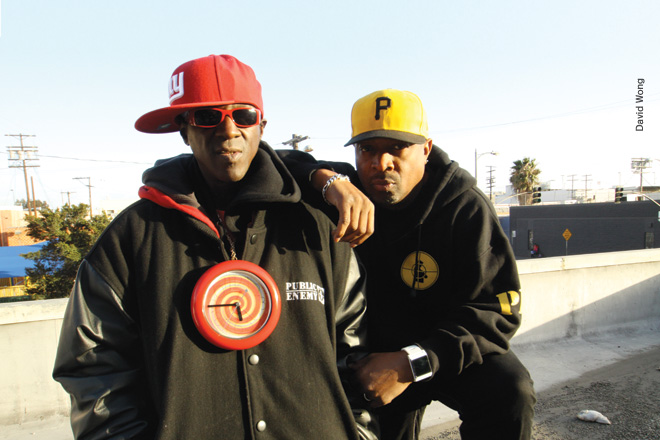 PUBLIC ENEMY
PUBLIC ENEMY
For founder Chuck D, rap has always been much more than just rhymes
Chuck D would be spending his time clinking champagne glasses now that Public Enemy is to be inducted into the Rock and Roll Hall of Fame. But the man who led the charge to revolutionize hip-hop has always been on a serious mission. Those who knew him as a student at Adelphi University recall his passionate debates about politics, philosophy and music, some of which he shared in rap. Those raps caught the ear of Def Jam co-founder Rick Rubin. Chuck D initially rejected the opportunity to become an entertainer, but finally plotted a hip-hop course—with such revolutionary concepts as backup dancers with Uzis and friend Flavor Flav as his onstage comic foil—that further tantalized listeners.
Yet for all his success, Chuck D says Public Enemy has only begun its mission. “I think this genre is fantastic, and now with social networking, we can take it to another level,” he says. “The thing that kept Public Enemy together for 25 years is that we’re able to see the world from a bigger perspective.”
Many would agree. Ever since the self-professed “prophets of rage” released their 1987 debut Yo! Bum Rush the Show, the group has been all about uniting the hip-hop community and encouraging other artists to follow suit. When 1988’s It Takes a Nation of Millions to Hold Us Back was hailed as a hip-hop masterpiece, Public Enemy rarely embraced celebrity. Instead, the group continued to lead other hip-hop artists toward music Chuck D defined as “CNN for black culture,” championing often unpopular causes and viewpoints.
But that news signal waned as record companies focused on superstar DJs, and the DJs in turn enjoyed the celebrity lifestyle. Chuck D hopes to take the genre back to the people. That’s why the band produced two albums this year with little fanfare: Most of My Heroes Still Don’t Appear on No Stamp and The Evil Empire of Everything were both released near the end of 2012.
“We have our own company. We don’t need anyone else,” says Chuck D. “We feel that the big artists should have been doing this every year. Once the art form turned, everyone wanted to make a killing. But that’s diametrically opposed to our responsibility to the community and the music. We want to help a new generation build this form into another form, another infrastructure. “We’re performing now, we’re relevant now and we use the past as a precedent. We can help build the next generation of music and performers.” –Nancy Dunham



comment closed